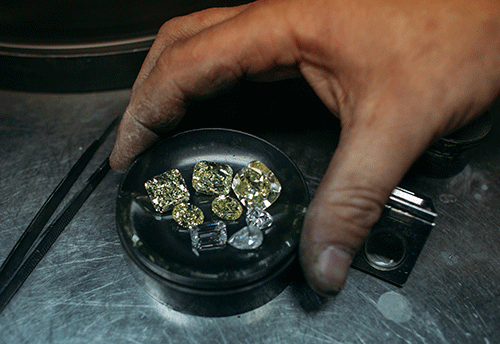Andre Messika Diamonds, a supplier of polished diamonds to the global luxury jewellery market, this week revealed it will be donating 25% shareholding in the company to its Namibian employees. This is in efforts to promote local ownership and participation in the industry.
At the launch of the share participation initiative on Tuesday, operations director at Andre Messika Marc Friedman said the company believes its employees are the lifeblood of the organisation, and their hard work and commitment has propelled the company to new heights.
“Through this programme, we aim to reward their invaluable contributions by providing them with a stake in our success. By becoming shareholders, they will not only reap the financial benefits, but also strengthen their sense of ownership and motivation,” he noted.
Andre Messika Diamonds is one of the leading diamond companies in southern Africa in training and employing disabled diamond specialists.
At the occasion, mines and energy deputy minister Kornelia Shilunga said this is a historic moment for Namibia’s diamond industry, and a significant step towards achieving the goal of promoting local ownership and participation in the sector.
She stated that the ministry formulated a mineral beneficiation strategy envisaged to transform the economy through diversification, job creation, skills development and increased income distribution.
“The shareholders of Andre Messika have shown their commitment to Namibia over the past 16 years by creating a state-of-the-art cutting and polishing factory with all the latest technology, polishing all its rough (gems) locally, but more importantly by investing in the people of Namibia. This has been bolstered by being one of the largest employers of people with disability in the country,” the deputy minister said.
She reiterated that the ministry continues formulating policies geared towards creating a conducive environment to investments for economic development and shared prosperity.
Namib Desert Diamonds (Namdia) CEO Alicia Amupolo added her voice, saying when employees have a stake in a company’s success, they are more likely to work towards its long-term growth and profitability. Fostering an environment that nurtures their talents is key to attracting and retaining high-quality employees, she observed.
“We strongly believe that local beneficiation of the diamond industry will continue to be a valuable partnership in promoting our nation’s diamonds. By aligning our efforts, our aim is to enhance the promotion of our diamonds in the international market and establish competitive prices in the midstream segment,” said the CEO.
Market differentiation and branding are integral to downstream beneficiation. It enables the creation of unique and branded diamond products which cater to specific market segments and consumer preferences.
Amupolo added that employing cutting, polishing and jewellery manufacturing techniques can produce high-quality, customised pieces which stand out in a competitive market and command premium prices.
Amupolo furthermore believes that this not only benefits individual companies, but also elevates Namibia’s reputation as a prominent diamond-producing nation.
Downstream success
On his part, Namibia Diamond Trading Company (NDTC) CEO Brent Eiseb stated that since the inception of downstream beneficiation, NDTC has made available in excess of N$75 billion worth of rough diamonds to NDTC sight holders for value-addition purposes.
According to the latest rough diamond import and export data, approximately 85% of the rough diamond carats sold by NDTC to its sight holders are being fully- processed in Namibia.
“This has resulted in a significant increase in the number of Namibina citizens employed in the downstream industry. The latest data indicates that the number of Namibian jobs have increased by some 53% over the previous 12 months,” he glowed.
What is worth noting is that the focus is not just on the number of jobs created, but more importantly on the sustainability and quality of jobs created by the industry.
Over the previous 24 months, seven cutting and polishing factories commenced with operations in Namibia. Of these, five successfully applied for and have started to receive diamonds from NDTC. This brings the total number of NDTC sight holders to 13.


